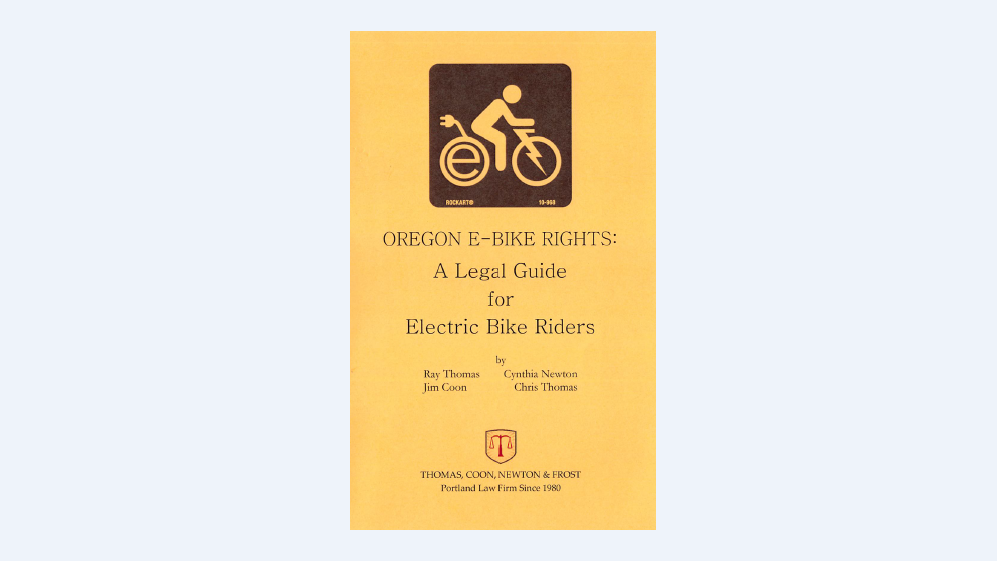On Friday, October 26th, Cynthia Newton and Chris Thomas presented a seminar on Oregon electric bicycle and scooter law to a group of fellow trial attorneys. Their presentation, entitled “Shock Me Like an Electric Wheel: Oregon E-Bike and Scooter Law,” covered the rules of the road governing e-bike and scooter use as well as what insurance coverage may be available following a collision. They presented as part of the Oregon Trial Lawyers Association’s annual all-day continuing legal education seminar covering topics relevant to motor vehicle collision cases. Cynthia and Chris appreciate the role that electric assisted vehicles can play in Portland’s transportation future, and were honored to speak on this important topic.
Category Archives: Electric Assisted Bicycle
Oregon Environmental Council Highlights TCNF E-Bike Booklet
The Oregon Environmental Council (OEC) recently published an article called “E-Bikes: Rules of the Road & Why We Love ‘Em.” Their post highlights the benefits, joys, and convenience of incorporating an e-bike into one’s daily life. They include testimonials from people who use e-bikes for family travel, to go camping or to keep doctor’s appointments, and as an alternative to commuting by car or motorcycle.
The OEC’s post also linked to TCNF’s newly-released free booklet on the rights and responsibilities of e-bike riders—E-Bike Rights: A Legal Guide for E-Bike Riders—which you can read more about here.

E-Bikes And E-Scooters On The Springwater, Esplanade And Other Portland Parks
The recent prevalence of e-bikes on Portland streets, and the even more recent influx of e-scooters, has increased the public’s curiosity about state and local law governing the devices. Many Portlanders now know that e-bikes and e-scooters are prohibited on sidewalks statewide, users of both must be at least 16 years old, and e-scooter users must wear helmets, but not e-bike riders. (For a comprehensive look at Oregon e-bike law, see our firm’s legal guide here.) A lesser known provision of Portland city code came to my attention recently in an article by the Oregonian’s Lizzy Acker, which included the following statement:
I emailed Portland Bureau of Transportation spokesperson John Brady on Friday to ask him some question about the scooters and he informed me that city code does not allow scooters in city parks, including the esplanade and the Springwater Corridor, so I can’t recommend you take this route home.
Announcing a New E-Bike Legal Guide by TCNF Bike Lawyers

TCNF’s team of bicycle trial lawyers is pleased to announce the completion of Oregon E-Bike Rights: A Legal Guide for Electric Bike Riders. Written by Ray Thomas, Jim Coon, Cynthia Newton and Chris Thomas, the booklet contains a comprehensive discussion of laws governing the use of electric bicycles in Oregon. Topics include riding in bike lanes, on sidewalks, in state parks and on federal land, as well as insurance coverage and advocacy efforts to improve e-bike laws. TCNF’s bike lawyers felt the need for this booklet now due to the recent increase in popularity of electric bikes and the interesting legal space they occupy between bicycles and motor vehicles.
You can download the booklet here. Updated to 2nd Edition in November 2018.
We hope you find this guide useful and that you contact us with any questions about Oregon e-bike law.
Are Electric Assisted Bicycles Legal to Ride in Oregon?
Electric Assisted Bikes, also known as e-bikes or e-assist bikes, are a growing trend, not just in Oregon but worldwide. The New York Times recently ran an article profiling the growth of sales that e-bikes are experiencing in Europe, and their growing popularity with “older people, delivery businesses and commuters who don’t want to sweat.” E-Bike Sales are Surging in Europe, August 25, 2014. There has been recent local focus as well. Jennifer Dill, Director of the Oregon Transportation Research and Education Consortium (OTREC) recently appeared on OPB’s Think Out Loud to discuss their growing use and yesterday the National Institute for Transportation and Communities released an in depth and well researched survey of the regulations surrounding e-bikes in the United States.
So, are e-bikes legal to ride like an unassisted bicycle? Yes, but with some very important differences (explained below).
An Electric Assisted Bicycle is a very specific creature in Oregon law under ORS 801.258. It must:
- Be designed to be operated on the ground with wheels;
- Have a seat or saddle;
- Have no more than three wheels;
- Have BOTH fully operative pedals for human propulsion AND an ELECTRIC motor; AND
- That electric motor cannot have an output above 1,000 watts AND it cannot be capable of propelling the vehicle at a speed greater than 20 MPH on level ground.
There are a lot of specific requirements for a bike to be an e-bike under the law. I have spoken to some owners of e-bikes who have motors above 1,000 watts that cannot get over 20 MPH and some who have motors at 1,000 watts who can get a speed higher than 20MPH. These are not Electric Assisted Bicycles under the law and are not granted the same rights as Electric Assisted Bicycle users.
Electric Assisted Bicycles are given the same status of bicycles under Oregon law. ORS 814.405. That means that, when reading other statutes, any rights or responsibilities given to a rider of a bicycle under the law is also given to the rider of an Electric Assisted Bicycle (unless specifically stated otherwise).
The key law in which Electric Assisted Bicycles are not given the same rights and responsibilities as unassisted bicycle operators is operation upon a sidewalk. Unassisted bicycle riders can, as a general rule, operate upon a sidewalk unless specifically prohibited from doing so by municipal ordinance (like downtown Portland and the Eugene transit mall area). However, Electric Assisted Bicycle operators are specifically excluded from riding on sidewalks statewide. ORS 814.410(1)(e).
This law creates an unnecessary inefficiency for an Electric Assisted Bicycle operator riding on the street or confined to the bicycle lane via ORS 814.420, but cannot legally escape to the sidewalk in the case of traffic or another blockage. This is an interesting restriction given the inability, by the very nature of its definition, for an e-bike to exceed 20 MPH, but an unassisted bike with the right rider could easily exceed 20 MPH on a sidewalk.
Another key difference between Electric Assisted Bicycles and unassisted bicycles is that operators under 16 are not allowed to ride Electric Assisted Bicycles per ORS 807.020(15).
